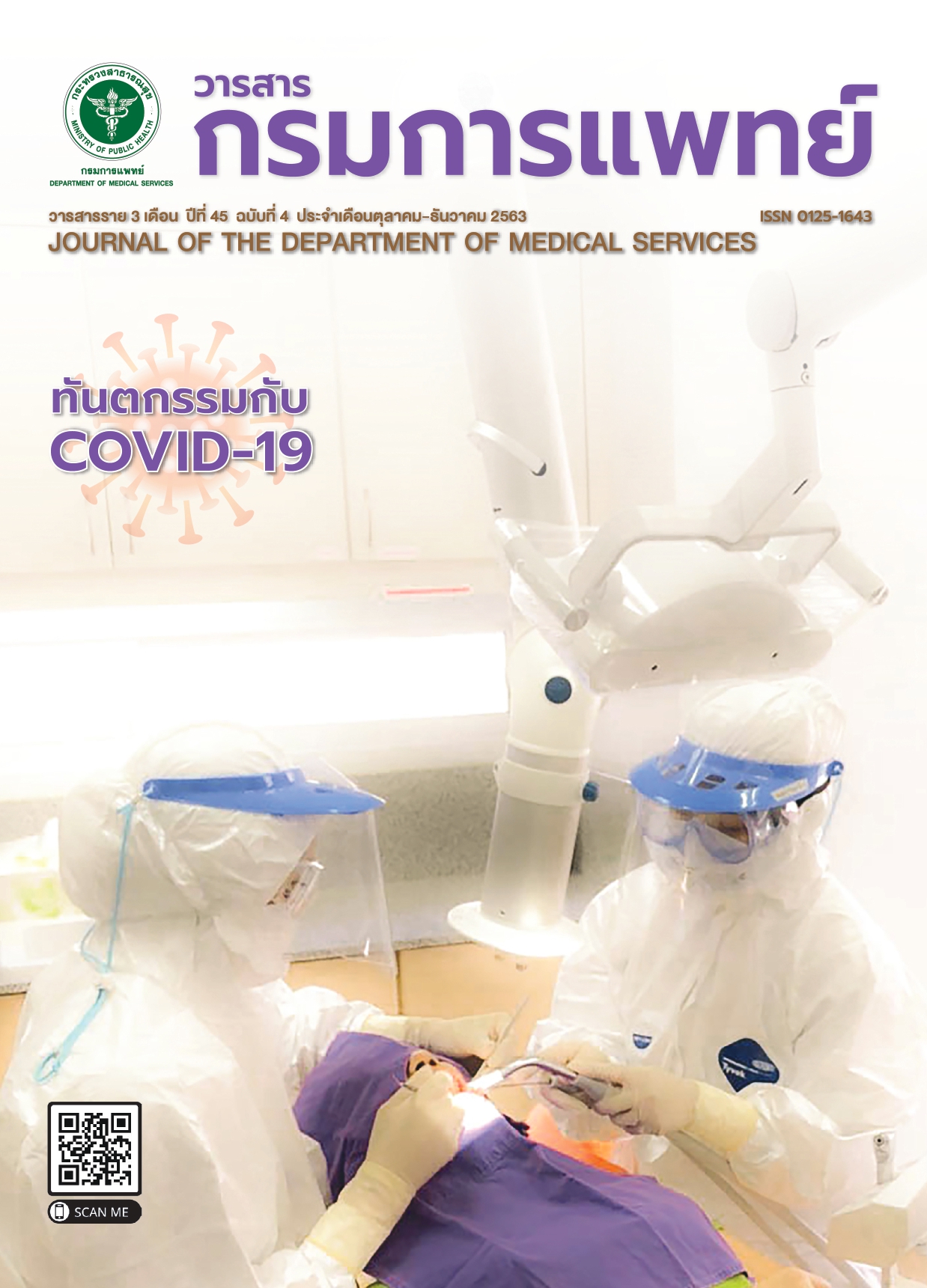Outcomes of THC Enriched in Advanced Staged Cancer Patients
Keywords:
Advanced stage cancer, Cannabinoids, Cannabis, Palliative careAbstract
Background : Delta-9-tetrahydrocannabinol (THC) derivatives have been used in pain management for palliative cancer care, unfortunately there was only few data in the efficacy of enriched THC cannabis oil (THC 0.5 mg/ drop) for this indication.
Objective : To determine the outcomes (safety, efficacy, and adverse drug reactions) of the medical grade enriched THC cannabis oil for quality of life (QOL) improvement in advanced stage cancer.
Method : The retrospective descriptive study of the advanced stage cancer patients who treated medical grade cannabis oil produced by the Government Pharmaceutical Organization (GPO) under the Special Access Scheme (SAS) during 1st March - 31st July 2020 in Medical Cannabis Clinic, Department of Medical Services (DMS-6) was conducted. All patients have been started with 0.5 mg THC per day sub-lingually and gradually titrated as needed. There were 63 patients who completed follow up for 30 days. The quality of life was evaluated by the Edmonton Symptom Assessment System (ESAS).
Result : The average age were 60 years and 55.6% female. The most common cancer was colon cancer. The daily used of THC were 0.5 - 5 mg. The severity of symptoms significantly improved in pain, tiredness, nausea, depression, anxiety, lack of appetite and insomnia while drowsiness, wellbeing and shortness of breath were not different. We also found the improvement of sleep (65.1%), pain reduction (50.8%) and appetite gained (42.9%) respectively. There were 19.1% adverse effects, however, most of them were mild symptoms suchas dry mouth or throat (17.5%). Nausea & vomiting (1.6%) and dizziness (1.6%).
Conclusion : Our findings suggested that THC enriched cannabis oil (0.5 mg/ drop) might be safe and potentially enhance the quality of life in advanced stage cancer patients especially the sleep quality, pain relief and appetite stimulation. However, the randomized controlled trial should be further investigated to warrant this hypothesis.
References
Strategy and Planning Division. Ministry of Public Health.Public Health Statistics A.D. 2019.
National Comprehensive Cancer Network. NCCN Guidelines Version I [cited 2020 Sep 21]. Available from:https://www.nccn.org/professionals/physician_gls/pdf/palliative.pdf
Queensland Government. Access medicinal cannabis. [cited 2020 Sep 21]. Available from:https://www.qld.gov.au/health/conditions/all/medicinal-cannabis/access.
NSW Government. Palliative care. [cited 2020 Sep 22];Available from:https://www.medicinalcannabis.nsw.gov.au/clinical-trials/terminal-illness-trial
Queensland Health. Clinical guidance: for the use of medicinal cannabis products in Queensland 2018 [cited 12 March 2019]. Available from: https://www.health.qld.gov.au/__data/assets/pdf_file/0023/634163/med-cannabis clinical-guide.pdf.
The Narcotics Act (No. 7) B.E. 2562. [cited 2019 Mar 12].Available from:http://www.ratchakitcha.soc.go.th/DATA/PDF/2562/A/019/T_0001.PDF
Abrams DI, Hilton JF, Leiser RJ, Shade SB, Elbeik TA, Aweeka FT, et al. Short-term effects of cannabinoids in patients with HIV-1 infection: a randomized, placebo-controlled clinical trial. Ann Intern Med 2003; 139:258-66.
Thanasitthichai S, Simasatikul C, Srisubat A, Krongkaew W,Kunin B, Seedadard R, et al. Safety and efficacy evaluation of the 1st legalized pharmaceutucal grade medical cannabis for palliative care in Thailand. Journal of the Department of Medical Services 2020; 45:116-22.
van den Beuken-van Everdingen MHJ, Hochstenbach LMJ,Joosten EAJ, Tjan-Heijnen VCG, Janssen DJA. Update on prevalence of pain in patients with cancer: SystematicReview and Meta-Analysis. J Pain Symptom Manage 2016;51:1070–90.e9.
Narang S, Gibson D, Wasan AD, Ross EL, Michna E, Nedeljkovic SS, et al. Efficacy of dronabinol as an adjuvant treatment for chronic pain patients on opioid therapy. J Pain 2008;9:254-64.
Noyes Jr R, Brunk SF, Baram DA, Canter A. Analgesic effect of delta-9-tetrahydrocannabinol. J Clin Pharmacol1975;15:139-43.
Noyes R Jr, Brunk SF, Avery DA, Canter AC. The analgesic properties of delta-9-tetrahydrocannabinol and codeine.Clin Pharmacol Ther 1975; 18:84-9.
Sorensen CJ, DeSanto K, Borgelt L, Phillips KT, Monte AA. Cannabinoid Hyperemesis Syndrome: Diagnosis, Pathophysiology, and Treatment-a Systematic Review. J Med Toxicol 2017; 13:71-87.
Brisbois TD, de Kock IH, Watanabe SM, Mirhosseini M,Lamoureux DC , Chasen M , et al . Delta - 9 -tetrahydrocannabinol may palliate altered chemosensory perception in cancer patients: results of a randomized, double-blind, placebo-controlled pilot trial. Ann Oncol 2011; 22:2086-93.
Nelson K, Walsh D, Deeter P, Sheehan F. A phase II study of delta-9-tetrahydrocannabinol for appetite stimulation in cancer-associated anorexia. J Palliat Care 1994;10:14-8.
Mücke M, Weier M, Carter C, Copeland J, Degenhardt L, Cuhls H, et al. Systematic review and meta-analysis of cannabinoids in palliative medicine. J Cachexia Sarcopenia Muscle 2018;9:220-34.
Strasser F, Luftner D, Possinger K, Ernst G, Ruhstaller T,Meissner W, et al. Comparison of orally administered cannabis extract and delta-9-tetrahydrocannabinol in treating patients with cancer-related anorexia-cachexia syndrome:a multicenter, phase III, randomized, double-blind,placebo-controlled clinical trial from the Cannabis In-Cachexia-Study-Group. J Clin Oncol 2006; 24:3394–400.
Johnson JR, Burnell-Nugent M, Lossignol D, Ganae-Motan ED,Potts R, Fallon MT. Multicenter, double-blind,randomized,placebo-controlled, parallel-group study of the efficacy,safety, and tolerability of THC: CBD extract and THC extract in patients with intractable cancer-related pain. J Pain Symptom Manage 2010;39:167–79.
Downloads
Published
How to Cite
Issue
Section
License
บทความที่ได้รับการตีพิมพ์เป็นลิขสิทธิ์ของกรมการแพทย์ กระทรวงสาธารณสุข
ข้อความและข้อคิดเห็นต่างๆ เป็นของผู้เขียนบทความ ไม่ใช่ความเห็นของกองบรรณาธิการหรือของวารสารกรมการแพทย์



